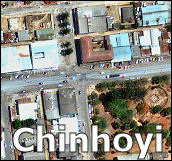![Baganmyo http://commons.wikimedia.org/wiki/File:Baganmyo.jpg [Public Domain] Baganmyo http://commons.wikimedia.org/wiki/File:Baganmyo.jpg [Public Domain]](https://www.exportlawblog.com/images/bagan.jpg) The White House last week issued a notice continuing the national emergency with respect to Burma. The notice itself is an annual rite of passage for all U.S. sanctions programs under IEEPA, including those relating to Burma. What is surprising this time around is that nothing has changed from past notices. The current notice still refers to the “unusual and extraordinary threat to the national security and foreign policy of the United States†by “the actions and policies of the Government of Burma.â€
The White House last week issued a notice continuing the national emergency with respect to Burma. The notice itself is an annual rite of passage for all U.S. sanctions programs under IEEPA, including those relating to Burma. What is surprising this time around is that nothing has changed from past notices. The current notice still refers to the “unusual and extraordinary threat to the national security and foreign policy of the United States†by “the actions and policies of the Government of Burma.â€
This is where the head-scratching should begin. A lot has happened in the past year or so that one would think warrants an updated (and apt) notice. In late 2011, Secretary of State Clinton made the first State visit to Burma since 1955. Last May, the President nominated the first U.S. ambassador to the country in over two decades. Just this past November, the President became the first sitting president to visit Burma. Most important to U.S. businesses was OFAC’s significant relaxation last year of countrywide sanctions prohibiting the export of financial services to Burma, new investments in Burma and imports from Burma.
All of these events are major developments in U.S.-Burmese relations. So why would the White House use a boilerplate notice when it could have taken the opportunity to depict an accurate picture of what U.S. foreign policy currently is? The notice is, of course, a legal requirement and the Burmese government has not shed all doubt over its commitment to democracy and human rights. But describing the situation as an “unusual and extraordinary threat” to the United States without any further context? In light of all this Administration has accomplished with Burma, it seems odd and misleading to use an off-the-shelf response in this instance.
One consequence of this on the U.S. business community will likely be time and resources many spend confirming that the sanctions that have been lifted against Burma have now not been repealed. Such a sanity check would be reasonable given the notice and especially for those who have begun exploring business with Burma.
The Administration should have a complete and consistent script of what U.S. foreign policy is with respect to Burma so it, and the rest of us, can all be on the same page.

 Posted by
Posted by  Category:
Category: 

![U.S. Navy photo by Mass Communication Specialist 2nd Class Jesse B. Awalt/Released (DefenseImagery.mil, VIRIN 090202-N-0506A-310) [Public domain], via Wikimedia Commons http://commons.wikimedia.org/wiki/File%3ARobert_Mugabe%2C_12th_AU_Summit%2C_090202-N-0506A-310.jpg U.S. Navy photo by Mass Communication Specialist 2nd Class Jesse B. Awalt/Released (DefenseImagery.mil, VIRIN 090202-N-0506A-310) [Public domain], via Wikimedia Commons http://commons.wikimedia.org/wiki/File%3ARobert_Mugabe%2C_12th_AU_Summit%2C_090202-N-0506A-310.jpg](https://www.exportlawblog.com/images/mugabe3.jpg)
 OFAC announced on Friday a
OFAC announced on Friday a  You may never have heard of the SEC’s Office of Global Security Risk and probably have no idea what they do. Well, although I know what they are supposed to do, I have always wondered what the people at that office do during the work day.
You may never have heard of the SEC’s Office of Global Security Risk and probably have no idea what they do. Well, although I know what they are supposed to do, I have always wondered what the people at that office do during the work day. According to an
According to an 

